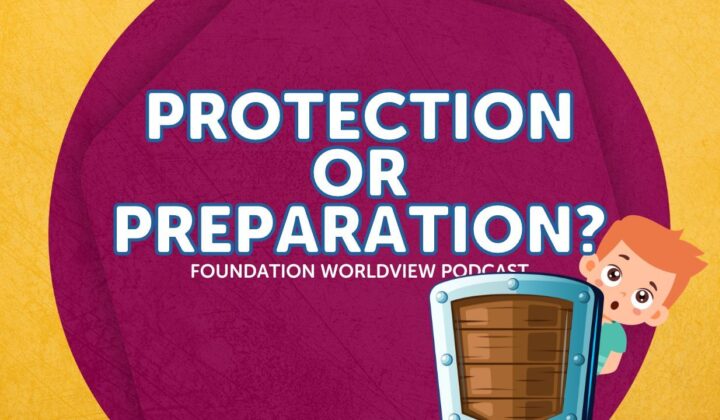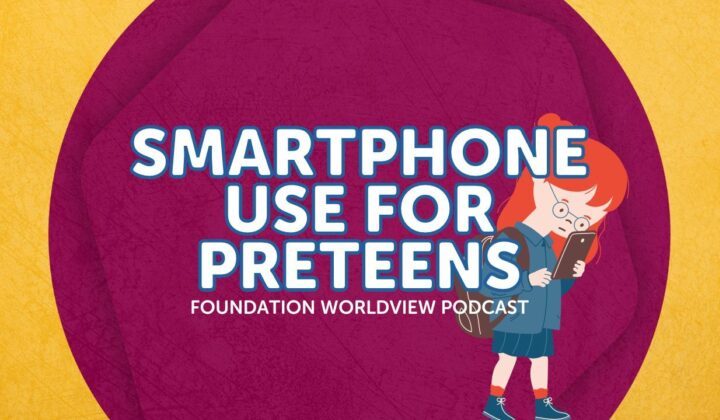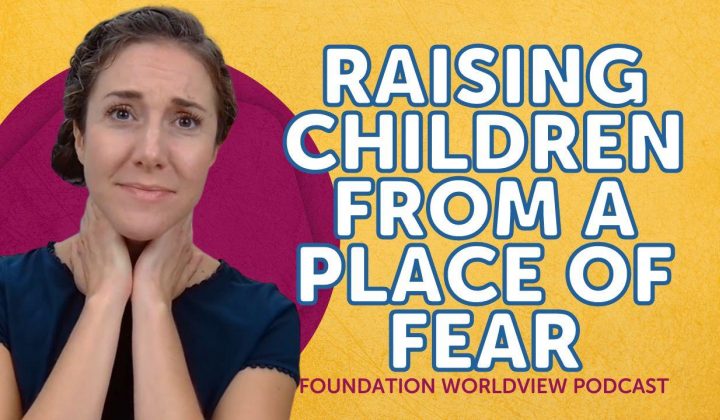Learn more about the journey that led to us equipping kids to carefully evaluate every idea they encounter.
Meet members of our team who have contributed to curriculum development.
Hear from real users of the Foundation Curriculum.
Learn what we believe about God, Jesus, Scripture, and more.
Teching Objective vs. Subjective Statements to Kids
In this episode, we tackle the question: How do we tell the difference between objective and subjective statements? Join us as we dive deep into this topic and discover practical ways to teach kids this important skill.
Transcript
Note: The following is an auto-transcript of the podcast recording.
Hello friends, and welcome to another episode of the Foundation Worldview Podcast where we seek to answer your questions so that you can equip the children that God has placed in your care to carefully evaluate every idea they encounter and understand the truth of the biblical worldview. I'm your host, Elizabeth Urbanowicz, and I'm thrilled that you've joined me for another episode today. Today's question says, "How does one tell the difference between subjective and objective statements, let alone teach it to kids?" Well, I am so glad that you asked this question. I actually kind of chuckled when I saw this question come in because I thought, wow, people are going to think that I just made this question up because it's something that we talk about at Foundation Worldview and that I love to talk about. So I'm so excited to dive down deep into this question today.
Before we do that, if you have found the content of this podcast beneficial, please make sure to like and subscribes that you never miss any future episodes. Also, ask that you would invest the time writing a review or if you're watching on YouTube leaving a comment. This helps more people discover the content so that we can equip as many children as possible to understand the truth of the biblical worldview.
Now, those of you who have followed the Foundation Worldview ministry for a while know that I'm very passionate about talking about the difference between statements that are objective versus those that are subjective because it's so important that our children understand the objective nature of truth before anything else. Because if our children don't understand that truth is objective, that it's outside of us, beyond the control of our inner emotional world, then anything else we teach them is just going to be swept away by the cultural tide.
In fact, at Foundation Worldview, we believe that helping kids understand the objective nature of truth is so important that we cover this topic in the first unit of our Biblical Worldview curriculum for kids four on up, our Comparative Worldview curriculum for kids eight on up, and our Careful Thinking curriculum for kids 10 on up. Now, before we look at how do we discern the difference between objective and subjective statements and then teach that to our children, we need to first understand what do the terms objective and subjective mean? Well, I just covered this a minute ago, a little bit of what objective means. Objective means something that is outside of us. It is outside the control of our inner emotional world that my thoughts, feelings, and desires cannot change the truth or falsehood of this statement. So objective statements are outside of us. They're not controlled by our inner emotional world, and they are either true or they are false.
Subjective statements are statements that are completely controlled, but by our inner emotional world, by our desires, by our preferences, by our emotions. So something that is subjective actually cannot be proven, true or false by anyone outside of the subject. For example, if I tell you that Fridays are the best day of the week, I'm sharing with you my subjective preference where you cannot prove that that is true or false because it's completely dependent on my inner emotional world. So we're going to look at some examples now of statements that are objective. They're outside the control of our inner emotional world, and they're either true or false, and then some statements that are subjective.
So an example of a statement that is objective is earth is round. It doesn't matter what I think, feel, believe, or desire about the shape of earth. Either earth is round or it is not round. My thoughts, feelings, beliefs, desires have nothing to do with the shape of earth, nor can they control the shape of earth and either earth is round or it's not round. For example, I could say earth is flat. That is also an objective statement. It is objectively false. It is wrong that earth is in fact round, but that's the whole point of an objective statement. It can be proven true or false based on evidence. So earth is round or saying earth is flat. Both of those are objective statements. One is objectively true, one is objectively false. Another objective statement is Monday is a day of the week. Monday being a day of the week has nothing to do with my inner emotional world. Now, while I might have inner emotional feelings about Mondays, my inner emotional thoughts, feelings, desires, preferences cannot change the fact that Monday is a day of the week. Okay? So saying Monday is a day of the week. That's either true or false. Another statement that is objective is chocolate is made of cacao beans. Okay, chocolate consisting of cacao beans cannot be controlled by my inner emotional world. Either it's true that chocolate is made of cacao beans or it is not true that chocolate is not made of cacao beans. Okay, so do you see how these are statements that I might have, thoughts, feelings, beliefs, and desires about these statements, but my inner subjective emotional world cannot control whether these statements are true or false.
Now, examples of subjective statements before I gave you the example of the statement, earth is round as an objective statement. A subjective statement would be earth is the best planet. Now, the term best, if we dive down into, okay, what do we mean by best, we might be able to determine, okay, does Elizabeth actually mean that earth is the planet that's most suitable for life? That would be an objective statement. We can either prove that earth is the planet most suitable for life, or earth is not the planet that's most suitable for life. However, simply saying, earth is best. That is just my inner subjective thoughts, feelings, desires about earth, and that might change from person to person. Somebody else might think that Mars is the best or think that Neptune is the best, or think that some planet and some other solar system or galaxy is the best. That is subjective. Another example of a subjective sentence would be Mondays are the worst. Okay? That shares my inner emotional thoughts, feelings, and desires about Mondays that I think Mondays are the worst day of the week, okay? But that's going to change from person to person. Maybe somebody else feels another day of the week is the worst day. Another subjective statement would be, chocolate is gross. That's actually how I feel about chocolate. I know I'm super weird, but saying chocolate is gross. That's based on my inner preferences. I do not prefer chocolate. Another person does prefer chocolate. So again, subjective statements are any statement that the truth of that is solely dependent on our thoughts, feelings, desires, our inner emotional world.
Now, sometimes there can be statements that are confusing. For example, if I say the sky is blue, and then I asked you, okay, is that objective or subjective? You might be thinking, is it objective or subjective? Like I've always been taught the sky is blue. I know that the color that the sky appears to me is blue. But what about people who are colorblind? What about cloudy days? Does this change from person to person from day to day? Well, sometimes we just need to dive deeper into the sentence, okay? What do we mean by the sky is blue? We mean that as light from the sun filters through our atmosphere. There's a light spectrum. There's a red end of the spectrum and a blue end of the spectrum. The blue end of the spectrum has shorter wavelengths and higher frequencies. So as sunlight comes through our atmosphere, we see the blue end of the spectrum. So the sky appears blue to us because that is the end of the light spectrum that we see. So saying the sky is blue, that is objective. Our thoughts, feelings, desires, cannot change the end of the light spectrum that we see. Well, then you might ask, well, what about somebody who's colorblind? Well, we know that they have an issue with seeing colors. That's why they are labeled colorblind, that their eyes do not correctly perceive the colors in the same way that a healthy functioning eye would. Another example of a confusing statement might be if somebody said, ah, the ref's call was terrible, okay, saying the ref's call was terrible, somebody else might say, no, that was a great call depending on which team you're rooting for. However, if we dive deeper into what do you mean by the ref's call was terrible. Do you mean it wasn't what I wanted? Because if that's what you mean, that's a subjective statement. If you mean that when we look at the camera replay, clearly when that ref said that the person on the basketball court was traveling, they were not traveling, okay? So if we mean the ref said they were traveling and they weren't traveling, that's objective. Either it's true that the ref incorrectly called that play, or it's not true that they're rough, incorrectly called that play. And then the example that I gave you before, if we say earth is the best planet, we might mean earth is the best planet to support life. If we just say earth is the best, planet like Earth is my favorite planet, that's subjective. It changes from person to person. But if we say Earth is the best planet to support life, that can be proven either true or false, by providing evidence, which it is true, that earth is the best planet for supporting life.
So now the second part of this question, how do we teach this to kids? How do we teach the difference between objective and subjective statements? Well, there's different activities that we do in those three curriculums that I mentioned, our Biblical Worldview, our Comparative Worldview, and our Careful Thinking. So the activity that we do in our Biblical Worldview curriculum for little ones is we first just teach them what truth is and we say truth is what is real. And then we have them play a game where we give them some sentences that are true and some sentences that are not true. And if we tell them a sentence that's true, they're supposed to raise their arms up like an X and say true as loud as they can. And if we tell them a sentence that is not true, they're supposed to cross their arms like an X.
And actually as I am recording this podcast, we just finished our first picture book at Foundation Worldview called What Is Truth? And when this podcast airs, it should air right after the release of this book. So we highly recommend that you check out our book, What is Truth? It's a fun and engaging and interactive book. All of the kids that we have tested it out on have loved it and have wanted to read it again, which is exactly what we want with picture books where we play this game. Is it true or not true? So that's an easy game you can play with little ones.
Then when you're pulling in the subjective part, the feelings part, we can introduce kids to the concept of feelings and say, okay, when I say a sentence, that's a feeling. I want you to cross your arms and give yourself a hug and say feeling, and then play that same game with true not true and feeling. And actually, as we are recording this podcast, we're also working on our second book about the difference between truths and feelings. So that's not going to release until Lord willing 2024, but keep your eye out for that because we'll soon have a second picture book out.
Then an activity for kids that are a little bit older, one that we have in our Comparative Worldview curriculum for kids eight on up is we recommend that you bake chocolate chip cookies with the children God has placed in your care. Or if you don't have time to bake 'em, just buy some at the store and then say, "okay, I want you to write down any truths about these cookies that are true for everyone." Okay, so those are the objective truths. Things like these cookies contain flour. These cookies contain gluten. These cookies were baked in our oven at home. These cookies have chocolate chips, things like that and say, "okay, I want you to write down a list of feelings about these cookies. Things that are going to change from person to person." Chocolate chip cookies are gross. Chocolate chip cookies are delicious. These cookies are too small. These cookies are too big. These cookies would've been better if they hadn't been left in the oven so long. These cookies should have been baked a little bit more. And so just have them write a list of truths that are going to be true for everyone about the cookies, and then feelings about the cookies to help them discern between objective and subjective statements.
Then an activity that we have in our Careful Thinking curriculum for kids 10 on up, similar to the activity that I just did with you where I gave you examples of objective sentences and then subjective ones. What we recommend is that you just give the kids in your care a list of sentences and you mix 'em up and then say, okay, I want you to tell me if this is an objective statement or a subjective statement and why.
And now we've discovered at Foundation Worldview that the sooner you train kids to discern the difference between objective and subjective statements, the easier it is for them. Most children who are four or five and six understand this without any difficulty. Sometimes children even understand it more easily than their parents do, but the older that you wait to introduce a child to the difference between objective and subjective statements, the more difficulty they have simply because we live in a culture that has this mantra, live your truth, proclaim your truth, okay, that might be true for you, but it's not true for me. We just live in this culture of relativism, and therefore, the longer our children live in this culture while they're swimming in this cultural stream, the more difficult it is for us to actually teach them what is true. Because the longer they swim in this cultural stream and they have these faulty ways of thinking, ingrained in their thinking, the more reformative work we have to do, and tearing down faulty ways of thinking and rebuilding with correct true ways of thinking.
So recommend if you have children, even as young as three or four, you can start playing that game with them, the true versus not True, true versus Feelings game. You can check out our Biblical Worldview curriculum, check out our What Is Truth? book just to start teaching the little ones in your care, these concepts as early as possible.
Well, that's a wrap for this episode, but as always, my prayer for you is we leave this time together, is that no matter the situation in which you and the children God has placed in your care, find yourselves. You would trust that God is working all things together for your good by using all things to conform you more into the image of His Son. I'll see you next time.
Related Posts and insights

Protecting Innocence while Preparing for the World
In this episode of the Foundation Worldview podcast, host Elizabeth Urbanowicz discusses how to approach sensitive topics such as gender and same-sex relationships with children, particularly in a homeschooling context. She emphasizes that protecting children does not mean completely isolating them from the world, but rather preparing them to confront and understand deviations from their beliefs.

Balancing Protection & Freedom: Navigating Smartphone Use for Preteens
Join Elizabeth Urbanowicz on the Foundation Worldview Podcast as she addresses a pressing concern for today's parents: How to strike a balance between safeguarding preteens from digital pitfalls, like explicit content, while still allowing them the freedom to connect with peers. Dive into biblically-informed and reality-based approaches to guide and protect the young minds entrusted to our care in a digital age.

Raising Children from a Place of Fear
In this episode, Elizabeth Urbanowicz addresses the question about raising children from a place of fear. What is healthy vs unhealthy fear? Listen in for insight and encouragement as you disciple the children God has placed in your care.





